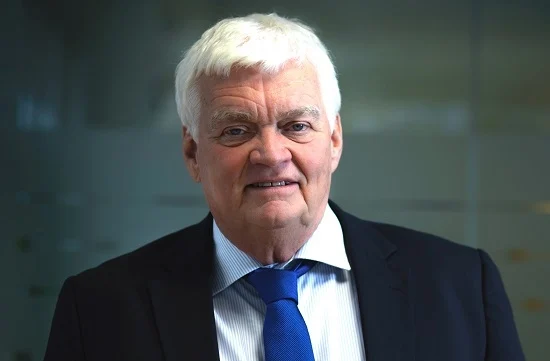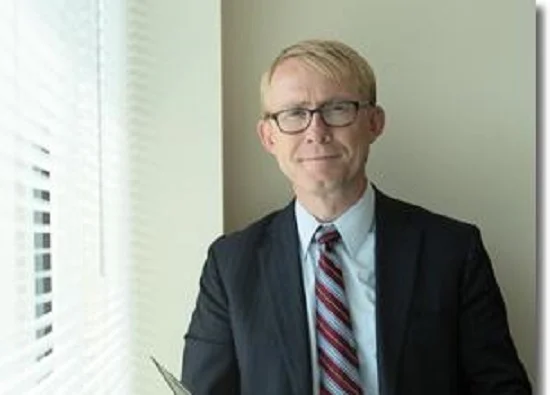Todd settles into life at Trading Technologies
8th February, 2022|Luke Jeffs

Todd plans to consolidate the firm’s dominance in listed derivatives while exploring new opportunities
There aren’t many people in derivatives who know more about building a software business than Keith Todd.
Cutting his teeth in telecoms where he rose to become head of ICL before it rebranded Fujitsu Services, Todd arrived in derivatives as executive chairman and chief executive of FFastFill, which he sold in 2013 to TT’s main rival ION Group.
More recently, he founded and ran KRM22, a tech firm with an innovative take on risk, and then became on December 21 chief executive of Trading Technologies, when private equity consortium 7Ridge comprising Cboe Global Markets and Singapore Exchange (SGX) completed its acquisition of TT.
The value of the deal was not disclosed but SGX said when the deal broke in late October it was investing about $200m (£146m) in the closed end fund set-up to complete the acquisition.
Speaking to Global Investor in late January, just one month into his new role, Todd is rising to the challenge.
“If you think about everything that Trading Technologies has been through recently, such as the multi-year technology transformation to Software-as-a-Service (SaaS), the whole COVID environment -- and to make it more interesting, a nearly two-year sales process -- it wouldn’t be surprising to find everyone debilitated, shattered and with low energy, but I am pleased to say TT is in great shape, and I have found the staff remarkably engaged, energised and positive.”
Todd is right that this is a good time for a change of management. The Chicago-based has completed the multi-year conversion of its clients to a SaaS-hosted version of its flagship TT platform. The firm also introduced on October 1 last year its first fee rise in years.
The new boss said the firm’s main clients, which are most of the world’s top investment banks, are similarly bullish about the next chapter for TT.
“The response from clients has been overwhelmingly positive. In short, the clients are pleased that the firm wasn’t acquired by an investment bank or an exchange. TT’s independence is very important to the marketplace, and the fact that TT remains independent has been met with relief by clients.”
Todd is referring here to late 2020 talks between the tech firm and Goldman Sachs about the US investment bank acquiring TT, a deal that would have spooked all but one of TT’s investment bank clients. The world’s top derivatives exchanges also had a look.
With that uncertainty behind the firm, Todd is keen to redefine the dynamic between TT and its top clients.
“The relationship between technology suppliers and their largest clients has been changing. Historically, the relationship was largely tactical and short-term, and there was an element of the client beating down the supplier. But that has changed, and major banks and brokers are now looking for longer-term commitments from their technology partners. The clients are thinking about: “What do we need over the next three-to-five years to enable us to grow?””
Todd said he and his management team are already talking to their key customers about how TT must evolve to help support their future requirements.
“The whole context of the conversation has gone from being a supplier to a more intimate, strategic relationship which will have a multi-year consequence to support their long-term growth,” said Todd.
“In line with that changing relationship, our largest clients do not want to support multiple third-party vendor relationships; rather, they want to engage with a platform-based business such as ours. As far as I am concerned, TT is in the right place at the right time and with the right people.”
TT was popular with traders for many reasons but one of them was that TT offered shorter-term contracts than its rivals, some of whom insist on multi-year deals.
But Todd said he wants to secure longer-term commitments that better reflect the changing relationship between tech firms and their customers.
“Given the importance of the front office, I’ve never understood why front office technology providers, unlike those in the middle and back office, are based on short-term contracts when it’s actually where the trading starts. Given the changing relationship with clients, this is a natural conversation and one that we will be having on a case-by-case basis.”
Asked about the possibility of further fee changes, Todd said the priority for the firm is securing these longer term arrangements with clients.
“The fee change [last year] was the first in many years, and it really it should have been done many years earlier. When clients have talked about fees historically, they talk about a “screen price,” but there is so much wrapped up in that including algos, FIX connectivity, different markets and analytics. It is critical that we continue to deliver the right bundle that gives customers the best value for their money, and, by definition, that means it has to be competitive,” Todd said.
He added: “I have never looked at fees from a price sensitivity point-of-view. Rather, I think about how we can add value to clients and offer them the right value proposition. The new fees took effect last year, and now we are looking ahead and building long-term relationships with clients.”
Underpinning those long-term relationships is TT’s commitment to product development and continually opening up new trading markets.
Todd said: “The functionality roadmap is continually evolving over time. The mantra in a SaaS business is always service quality. Ours is good - it’s as good as is out there - but we must continually invest to make it even more reliable. I’m a strong believer that if a firm has a high quality of service, the opportunity for growth is huge, but, if it is playing defence on service quality, that growth opportunity disappears very quickly.”
The TT chief continued: “So we are looking to drive new functionality to enhance the Order Management System (OMS) offering or add more market access like cryptos. That said, there are, of course, limitations to resources, but we can continue to enhance our offering by partnering with third parties that have specialist functionalities and make the integration seamless to our customers. We won’t necessarily invest in every partnership, but we will invest in some, and we will acquire some assets so there is a full range of possibilities.”
Trading Technologies invested in January $6.35 million in KRM22, Todd’s old firm based in London. The first investment by TT since the 7Ridge Acquisition, the firms also entered into a distribution agreement to make KRM22 risk tools available to TT clients, in what was anticipated to be the first stage of closer cooperation between TT and KRM22.
Todd said: “KRM22 is just the first of a number of partnerships where we will make third-party products available on the TT platform. Previously, the main focus for TT was transitioning clients, but we are past that now.”
An early deliverable for Todd is a new order management system, building on TT’s existing offering.
“Work in an advanced state on our order management system was well underway when I joined in December. TT has had an order management system for a number of years, and the work before I arrived has substantially addressed the gaps in our existing functionality. We have a couple of ideas we expect to action into Q1 that would, I would argue, make TT the market’s leading OMS product by the end of March.”
TT is also popular because it is continually opening up access to the markets the traders want to trade.
Talking of which, Todd said: “There is obviously a lot of activity in crypto, but we are fully aware that there is also a lot of potential for danger. Traders naturally gravitate towards volatility so crypto is a natural place for us, and we are currently completing our evaluation of the next platforms that we will connect to.”
The other big story of the past two years is the increasing use of options by retail traders. Reflecting on that trend, Todd said: “Options make up an ever-increasing part of the trading world. The challenge for a technology firm such as ours is that as you move into the more sophisticated end of the options market, the number of players reduces exponentially because it’s such a niche market. Mainstream options are gradually growing and present an opportunity for us, but the more bespoke, exotic end of the options market is less important and not a priority for us.”
With an experienced business leader like Todd taking the helm, it’s no surprise that continuity is important.
“Our priorities at the moment are to maintain and constantly enhance service quality, consolidate our position in exchange-traded derivatives and move into multi-asset classes. The last piece is not something for us in 2022 necessarily, but we will be looking at it aggressively. I have already recruited someone to the leadership team to specifically address that so you should start to see some things happening later this year.
“That said, we have a massive opportunity to consolidate our position in derivatives. But we have to be very disciplined in keeping customers happy before we race over to another market.
Todd added: “We are asking our exchange-traded derivatives customer base which asset classes they would like us to move into next, and there are some that are naturally more interesting to that group of traders than others. Mainstream FX, fixed income and equities is a different multi-asset game which we will address in time. I have always said that business is a team game. We have some 282 staff, and the power and capability they have between them is incredible. It was remarkable how people aligned behind the opportunities we have and what we are going to do together.”
Talking of staff, Todd sees an opportunity to diversify further outside of TT’s home market. He said: “Looking ahead, what the leadership team is aligned on is promoting from within wherever possible and rebalancing the skills base globally as we grow. Currently the staff are about two-thirds in Chicago and the remaining outside, but we are a global company with revenue split 50/50, and I believe it is the natural process of a global company to be more balanced. I think we will always be slightly more US-based than the rest of the world, but there will be more balance.”
Todd continued: “We have a fantastic array of talent around the world, and we’ll build on that, and we’re also expanding our intern and graduate recruitment programmes not just in Chicago, but also in London, India, Singapore and Sydney.”
Todd’s strategy can be simplified into two strands: to consolidate TT’s dominance in listed derivatives trading software while exploring new opportunities that may lie outside of that market.
That two-pronged approach is also evident in Todd’s thinking about clients.
He said: “Traditionally the focus for TT has been on the sell-side, reaching the buy-side through the sell-side. That has been the cornerstone and that will continue, but we’re also intending to build relationships alongside the sell-side to sell directly to the buy-side to expand what services the buy-side can get from TT, such as our surveillance products.”
Todd added: “The third focus area is exchanges; they are realising now that we are strong enough as a partner to help them grow their businesses because we have global reach.”
Keith Todd is wasting no time tackling the challenges of leading TT into its next chapter. His blend of continuity and innovation is sensible for a firm like TT whose clients can draw confidence from his pragmatic yet ambitious philosophy.


